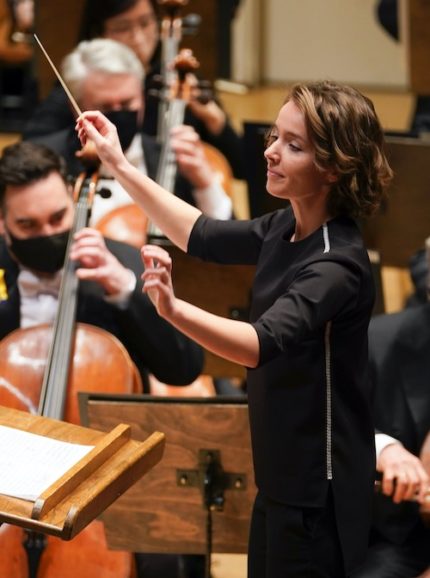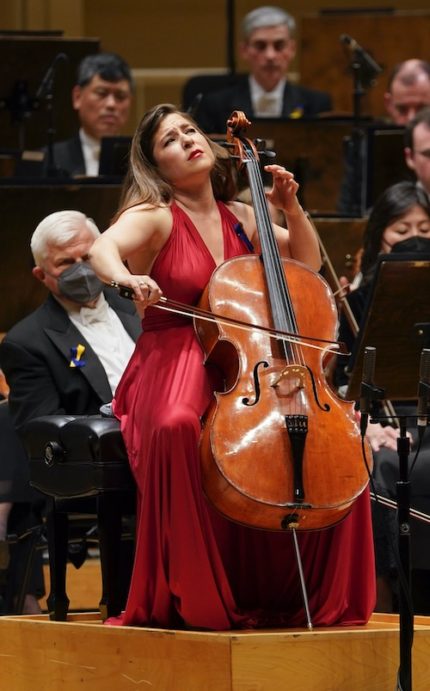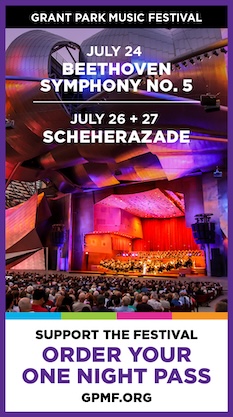Rakitina makes mixed CSO debut in lightweight Tchaikovsky program

Anna Rakitina is a rising star in the world of young conductors. She was a Dudamel Fellow of the Los Angeles Philharmonic for the 2019-20 season, and is currently an assistant conductor at the Boston Symphony Orchestra. Last November she made a compelling local debut leading the Elgin Symphony in a memorable Tchaikovsky Fifth, and Thursday night she took her first turn with the reins of the CSO at Orchestra Hall.
The 32-year-old Russian was stepping in for Edo de Waart, who last month withdrew from these concerts citing “scheduling conflicts.” Unfortunately, Rakitina inherited from the Dutch elder statesman an uninspired all-Tchaikovsky bill—a pops program in all but name—which remained unchanged and likely hampered the first impression she made.
The program opened with the Capriccio italien, last heard downtown over twenty years ago. Thursday’s performance was a reminder why Tchaikovsky’s colorful travelogue is not offered more frequently on subscription concerts (though it is common fare in a setting like Ravinia). Despite its memorable themes and vivid orchestration, the Capriccio does not escape the sense of pastiche.
Rakitina struggled to make this music sound like more than the simple medley it is. There were minor ensemble issues throughout the work’s opening, and many transitions felt clunky, with tempo shifts often taking a few bars to feel settled. The week’s rehearsals were split between Rakitina’s program and the Jurassic Park soundtrack concerts (just two for each), which may have contributed to these difficulties; a jangling cell phone that desecrated an atmospheric silence early on did not help the mood. Principal trumpet Esteban Batallán’s acrobatic trumpet solos were nonetheless a highlight.

Cellist Alisa Weilerstein was the evening’s soloist in both Tchaikovsky’s Variations on a Rococo Theme and Pezzo capriccioso. Weilerstein was an elegant protagonist in the classically inflected Variations. She played with eloquent, vocal simplicity where called for, and was exceptionally articulate in more virtuosic passages. She opted for quicker tempos, avoiding the temptation to make a slow movement out of Variation III (marked Andante, not slower). There were moments in the coda where Weilerstein and the orchestra risked coming apart, but Rakitina maintained a firm enough hand to avert disaster.
These were only the second subscription performances of the Pezzo capriccioso, not heard downtown since its first outing in 1976 with Lynn Harrell. The seven-minute work had the feel of a planned encore (despite being placed after the intermission). Weilerstein brought pathos to the work’s anguished opening paragraph, and continued solo flair to the breakneck perpetual motion conclusion.
As an encore Weilerstein offered the Sarabande from Bach’s D Minor Cello Suite. She noted from the stage that the day marked a month since Russia’s invasion of Ukraine, and offered the somber movement in solidarity with the people of that country. While her playing wove a thoughtful narrative, the bleak meditation felt somewhat out of step with the rest of the program. Given that the evening was devoted to Russian music, led by a conductor of mixed Ukrainian and Russian parentage, it felt like there were more complex geopolitical questions than could be engaged with a heartfelt encore, however artfully executed.
The evening concluded with selections from The Nutcracker, essentially the well-known Suite, Op. 71a, with the famous Pas de Deux added to the end. Rakitina led an accomplished performance, though at times it felt impossible to escape the strangeness of hearing this now traditionally yuletide music in March.
Wind principals made colorful solo contributions throughout the characteristic dances. An unexpected standout was principal percussionist Cynthia Yeh, who seemed to find an infinite variety of colors in the tambourine, triangle, and cymbal adornments she provided. Rakitina let the low brass get somewhat out of hand in the Waltz of the Flowers, but led a surging and ardent Pas de Deux to end her first night at the CSO helm.
Let us hope Rakitina is afforded the opportunity to make a second impression at Orchestra Hall in more compelling repertoire. If only there were a regional orchestra in the area looking for a new conductor—something like, I don’t know, the Elgin Symphony Orchestra—with the good sense to snap her up for local audiences.
The program will be repeated 8 p.m. Saturday. www.cso.org
Posted in Performances

Posted Mar 25, 2022 at 3:06 pm by Peter DG
That cell phone alarm was disgusting–very loud bell chimes about a minute long. Imagine if it came during the Bach–there would have been an audience riot!
As a longtime subscriber I don’t mind some light “pastiche” and the Capriccio certainly was that. But the cello pieces, including the encore, were about as far from pops as you can get. And no pops orchestra would have played The Suite like the CSO did. I never heard as much nuance and virtuoso playing in the Nutcracker as we heard last night. The applause at its end was phenomenal.
Some in audience around us did not come back after the intermission, apparently they were there just to hear Alisa’s cello playing. They missed her Bach encore, which was very emotional.
As to your destination Elgin quip: hey, why not Ravinia if that opens up?